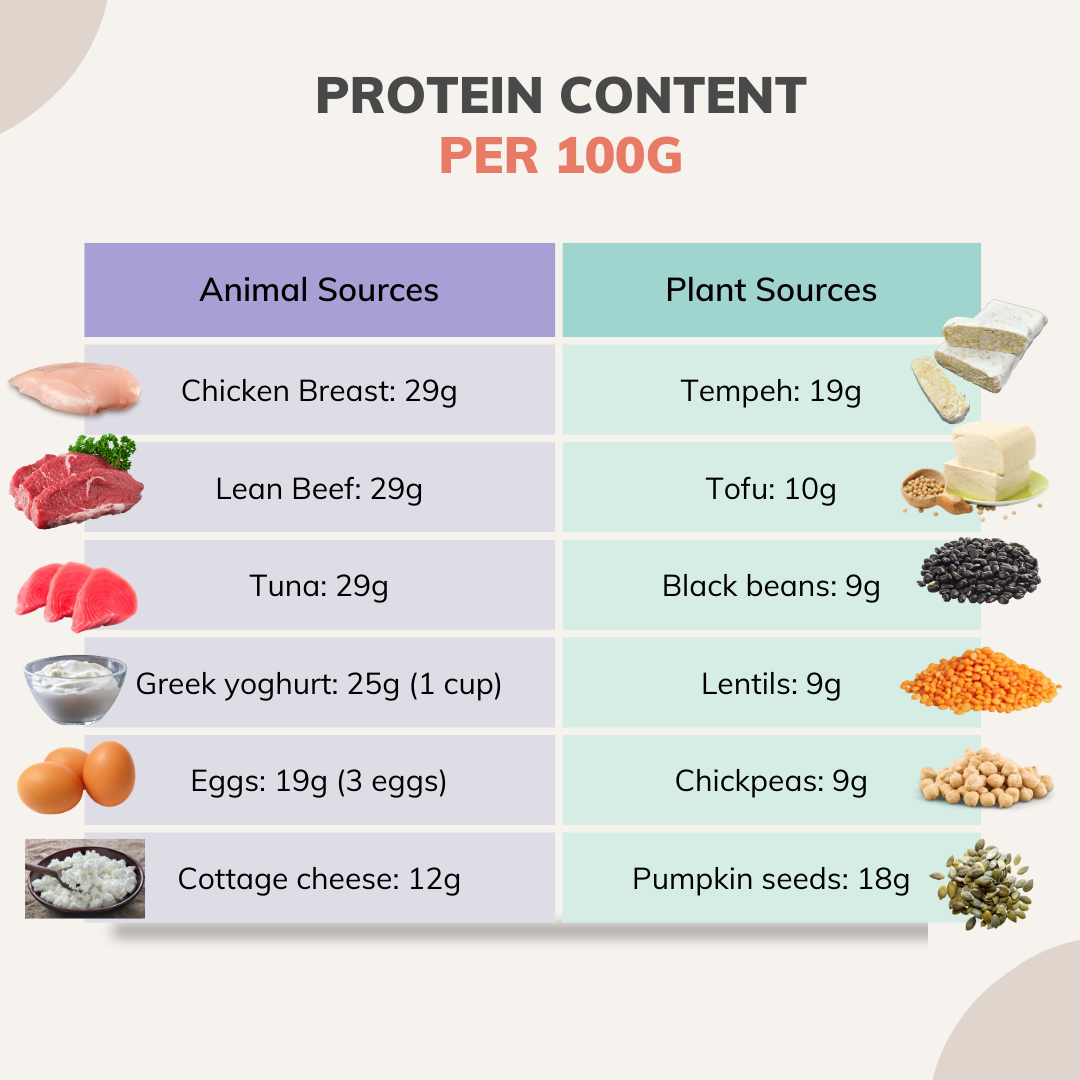Protein
05.07.2023
You might have heard the importance of including protein in your diet. But how much should you eat? How do you get enough of it? Do you need a protein supplement?
Let’s answer these common questions!
First, let’s cover the basics of protein…
Protein is one of the macronutrients that, along with carbohydrates and fats, make up our diet. It’s predominantly found in animal products, but can also be found in other sources like legumes, nuts, seeds and whole grains. Protein is made up of amino acids. You may have heard of ‘essential amino acids’ - these are the type that can’t be created by the body itself, and must come from food.
How important is it?
Approximately 60% of our body is water. Half of the remaining 40% is protein! Our eyes, skin, organs, and hormones all contain protein - it’s essential for our everyday bodily functions.
The structure, function and regulation of all tissues and organs in our body rely on protein. This includes our muscles! Our capacity to repair and rebuild muscle tissue relies on our ability to meet the needs of our body’s protein turnover. So we need to ensure sufficient protein intake to meet these requirements and provide the foundation to build and maintain muscle.
What if my goal is weight loss, not muscle gain?
Protein should still absolutely be a nutrient of focus for you! Protein is a high-satiety food, meaning it’ll help you feel fuller for longer. This is particularly helpful when you are reducing overall caloric intake, which is a key element of a weight-loss protocol. Additionally, a high-protein intake (in addition to resistance training) while you’re in a weight-loss phase will help you minimise muscle loss, allowing your overall weight-loss to come from losing fat instead! We also experience a natural decline in muscle mass and strength as we get older. Adequate protein intake in addition to resistance training helps reduce muscle loss during this process. So, protein intake becomes even more important the older we get.
Ok, got it - protein is important! So how much protein should I eat?
This depends a lot on personal factors such as your age, sex, activity levels, and your goals. In general, if you are mostly sedentary, have a higher fat mass, and are not looking to gain muscle, 0.8-1.5g of protein per kilogram of bodyweight is a good target per day. However, for a lot of people, intake should be much higher. If you engage in regular exercise (especially resistance training), the range to aim for could be between 1.6-2.2g per kilogram of bodyweight. Even higher if you are quite lean.
How do I get protein in my diet?
You should try to spread your protein intake across the day, to keep your protein stores topped up as well as keep you feeling satiated. When building your meals, think about filling roughly a quarter of your plate with a source of protein, a quarter with wholegrains, and half your plate with colourful vegetables, fruits and salads!
Consider the foods in the image. These are all 100g servings, but as you can see, some contain much higher quantities of protein. You don’t need to only focus on eating the most protein-dense foods, just be aware that when using the foods with lower quantities as your protein sources, you’re going to need larger servings to get the same amount of protein! Aiming to consume a balanced intake from multiple of these sources will help you to cover all your essential amino acids.
If I don’t eat meat, how do I get enough protein?
It is possible to get enough protein through plant sources, however this may take more careful consideration. It’s easy to undereat protein if you follow a vegetarian or vegan diet. Many plant sources of protein require eating a higher volume of food, for the same amount of protein.
It’s best to choose a very high-protein source of plant food at least once a day, such as tofu, tempeh or seitan. You could also consider a plant-based protein supplement.
Do I need a supplement?
While not essential to your diet, protein supplements can be hugely helpful in terms of convenience and taste!
For example, if you eat breakfast in a rush or on the go, adding a protein powder to your muesli is an easy way to make sure you’re getting enough protein in your first meal of the day. Or if you’re someone who tends to snack on sweet things after dinner, having a chocolate-flavoured protein drink as your evening treat could be a good way to help you feel satiated and increase your nutrient intake!
Our friends at Ivanhoe Health Store have a huge range of protein powders and can advise you on what protein supplement is right for you.
Plus, Phase 1 members get 10% off in store!


